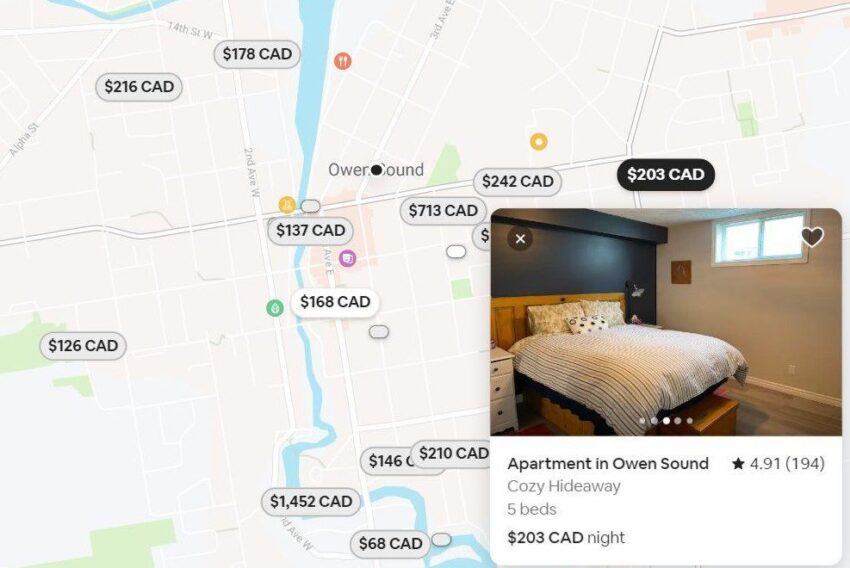Owen Sound council is taking another look at its short-term rental licensing program after concerns were raised about some of the rules set out in the planned bylaw.
On Monday, council was set to pass its bylaw to license, regulate and govern the operation of short-term rentals in the city beginning next March. But at the request of Coun. Travis Dodd, council voted to reconsider the matter and have asked for a staff report with more information about some aspects of the bylaw.
Dodd highlighted as concerns the decision to cap short-term stays to 90 nights per year, and the citywide requirement that STRs be permitted in only principal residences, including in areas zoned non-residential or mixed use. He also raised the prospect that the bylaw as presented was so prohibitive that they wouldn’t get enough STR operators to sign up to ensure the system remained cost neutral, and the city would lose revenue through a planned municipal accommodation tax it plans to implement.
Dodd noted that it will cost approximately $35,000 annually for a licensing co-ordinator to run the program, requiring 70 STR sign-ups to keep it cost neutral, leaving it on the “current resident taxpayer” to fund if they don’t reach that level.
Dodd said they don’t yet know if the licensing program will have the intended result of adding more housing stock to the market and may cause more problems by removing rentals from the market used by travelling workers such as nurses and contractors and impact tourism in the city.
Earlier in the meeting during public question period, council heard from resident Karen Rosalie McRae, who has been working on a plan to live in the upstairs of her home with STRs on the lower level. McRae said she is a senior with non-visible disabilities and was hoping to support herself with the rentals.
McRae said her “historically significant” home has many features such as tiger oak, pocket doors and stained glass windows, which she fears would be ruined by long-term renters. She said in the past she has tried renting rooms and tenants caused about $20,000 in damage.
It was suggested McRae operate her home as a bed and breakfast, which would allow her to rent it out 365 days a year, and Mayor Ian Boddy suggested she set up a meeting with staff to explore her options.
The city began working towards an STR licensing program after last year concerns were brought to council about a large house on 4th Street West, known locally as Millionaire’s Drive, which neighbours said had been rented out for short stays, turning it into a “party haven.”
There was a call at the time to ban non-owner occupied STRs in the city, which council voted down. Many wanted more information on the matter, but indicated something needed to be done.
In June, council approved a Corporate Services Committee recommendation to direct staff to implement the STR licensing program, which included a $500 annual registration fee, restricted STRs to primary residents, and capped the maximum number of renters per property at eight among other measures.
Last month, council voted to tighten the rules, limiting short-term rentals to 90 nights per year, down from 180 days recommended in a previous draft bylaw. Bed and breakfasts were subject to the STR bylaw, but not the nights cap or the maximum eight-person requirement per property being as they are businesses where the operators live and can supervise.
Greig, who spoke in favour of adopting the bylaw as it was presented on Monday, said the licensing program is in response to a housing crisis across North America and he sees it as just one of the tools to fix it.
The follow-up report from staff is expected back before council next month.

